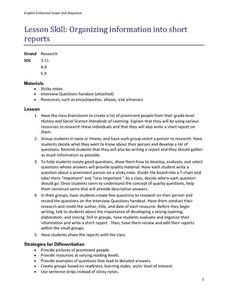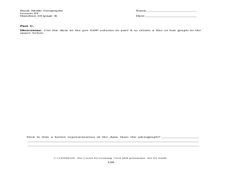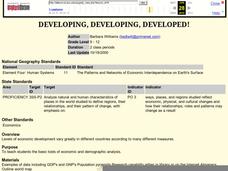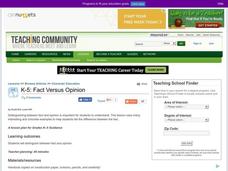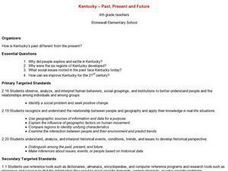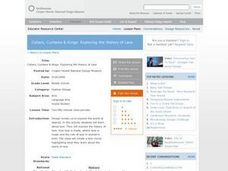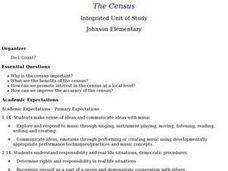Curated OER
European Elevation Sort
Given a prepared database of European countries, sixth graders sort the countries in ascending order by elevation and identify the five countries with the highest elevations. This cross-curricular lesson combines elements of computer...
Curated OER
Organizing Info into Short Reports
The class brainstorms a list of prominent people from their knowledge of social studies. Groups of two pupils get together and select one of these people to research. They create five questions to research on their person and record them...
K5 Learning
Miss Mitchell's Comet
Maria Mitchell discovered a comet, became the first female astronomer in the United States, and even has a crater on the moon named after her! Learn more about her passion for the stars with an informative reading passage, followed by...
Curated OER
Population and Population Density
Students read and interpret graphs. In this population instructional activity, students explore population and population density as they read several data graphs and respond to questions.
Curated OER
Synthesis of Information
Locating and synthesizing information is an essential part of the research process but can be overwhelming for many young writers. Eliminate some of the stress and confusion, this resource suggests, by separating these steps. To focus...
Curated OER
Iraq, Where's That?
Students identify the Middle Eastern countries on the map and the oil-producing countries of OPEC in the region. They examine whether the presence of important producing oil fields qualifies as a characteristic of this region.
Curated OER
"Logs of Straw: Dendrochronology"
Young scholars act as dendrochonologists working to reconstruct a 50 year climatic history. They make a personal timeline.
Curated OER
Baseball--Where the Parks Are
In this social studies worksheet, students utilize a map to label the location of each city with a Major League team and then with colored pencils label the homes of the All-American Girls League teams.
Curated OER
Legacy of Colonialism
Students explore the extent of colonialism from the early periods in the 1500's to the later years in the mid 1900's. They explain how colonization differed in regions around the world and examine the lasting effects on the colonized...
Curated OER
It’s Your Birthday! – Conventions: Revision and Proofreading
Happy birthday! Celebrate everyone's birthday with this writing activity, which prompts seventh graders to research historical events in a country at the time of their birth to create an essay. Working in pairs, they proofread each...
Curated OER
Living in an "Olympic" Country
Students research countries participating in the Olympic Games. They create a database which includes graphs for comparing population density, the number of athletes, per capita income, etc. for each country. This project is completed...
Curated OER
Geography of China (Tibet)
Sixth graders study the geography of Tibet. They create maps of Tibet. Students predict population, land area, water area and coastline length of the United States and Tibet. Students compare and contrast the day-to-day lives of people...
Curated OER
Developing, Developing, Developed!
Students differentiate among and explain various levels of economic development around the world. They see that levels of economic development vary greatly in different countries according to many different measures.
Curated OER
Fact Versus Opinion
Learners differentiate between fact and opinion. They define fact and opinion, then listen to and identify examples of each. Students identify different books where facts and opinions can be found, and cut out newspaper and magazine...
Curated OER
To Your Health
Students read articles on health and read about how storks and other animals are cultural icons in bringing good health. In this health lesson plan, students also list ways to live a healthy lifestyle.
Curated OER
International Curiosity and National Pride
Students analyze their own culture and a Bulgarian culture to identify national, local, or ethnic traits. In this culture analysis lesson plan, students identify three important characteristics of their culture and compose a list of...
Curated OER
Franklin Learning Activities
Middle schoolers participate in different activities examining Benjamin Franklin and his activities. They work together in groups and as a class to research his inventions and his self-improvement plans.
Curated OER
Is Global Warming Happening?
Students investigate the probability of global warming and the effects of global warming on the environment. They conduct Internet research and collect data, transfer the data onto an Excel spreadsheet, and create a presentation that...
Curated OER
Pen Pals
Fifth graders become pen pals from other countries and research their countries for information that help with their writing. This information is then sent to another student who is also portraying someone from another country.
Curated OER
SAVE OUR EARTH
Students research current environmental problems in order to develop and deliver an oral presentation. The presentation persuades the audience to act on the student's point of view on the issue.
Curated OER
Kentucky: Past, Present and Future
Fourth graders analyze how Kentucky's past is different from the present. They research why Kentucky was even explored and settles. What social issues face Kentucky now. Discussion lies on how Kentucky can be improved for the 21st century.
Curated OER
Collars, Curtains and Kings: Exploring the History of Lace
Students design to explore the world of objects as related to lace. Students will create a lace mural highlighting what they learn about the world of lace. Students brainstorm ideas via the internet websites.
Curated OER
The Census
Students analyze why the census is important and the benefits of it. Determine rights and responsibilities in real life situations. They are divided into groups and take a mock census of a list of teachers and students each. Results of...
Curated OER
Social Sstudies: Change in Space and Time
Students examine the dynamics of change and compare and contrast it with other cultures. They cite examples of how people change over time and explain why it is necessary. Students organize a skit, Webpage, or Powerpoint presentation...



